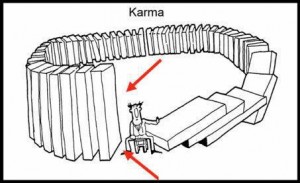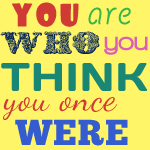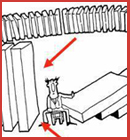 The “law of karma†can seem quite foreign and exotic to a modern Westerner. But in a post-Freudian age we are accustomed to thinking that the past affects our experience of the present. And this is, after all, the essence of what karma’s all about.
The “law of karma†can seem quite foreign and exotic to a modern Westerner. But in a post-Freudian age we are accustomed to thinking that the past affects our experience of the present. And this is, after all, the essence of what karma’s all about.
We can all agree that our present lives are at least influenced, if not wholly determined, by what happened to us in the past, and by what we did, said, or even thought in response to what happened. And so, to this extent at least, we all accept a fundamental premise of the karmic worldview.
But as we have also learned here in the West, it’s not what really or actually happened in the past that matters. In fact, what really happened is totally inaccessible to us – partly because events are subjectively and not objectively experienced, and partly because the past is, after all, done and gone and therefore obviously unavailable to us.
What is available – the only available thing – is not the past itself but our memories of it. And our memories of the past are not what actually happened (is anyone still unclear about this?) but what we think happened.
So the past does exist, but only as a part of the present. William Faulkner was right when he said, “The past is not dead. In fact, it’s not even past.†What we mean by “the past†is, upon analysis, nothing other than an idea of what has already occurred that we carry around in our present minds. “What happened†is really just (and always) a portrayal, a construal of the past. It’s what we think happened, or more accurately, it’s what we presently think happened.
The past is never like it used to be. What we remember are not snapshots or videotapes but abstract paintings that we are perpetually touching up, if not recoloring altogether. The past and the present exist, like everything else, interdependently. And so it is that the past depends on the present – it is the backstory we give ourselves from our current perspective. And it is also the case that the present depends on the past – our sense of who we are in the here and now is a function of the kind of past we think we had.
We are who we think we once were. And this is why karma is true. We don’t have karma; we are karma. Our memories – conscious and subconscious – of the kind of person we think we once were, based on what we think we have done, said or thought, are indivisibly connected to our present sense of identity.
But because neither the past nor the present exist independently of the other, it is also the case that our sense of the past is shaped by our present. It is from the perspective of the present that we think about our past. So if we are who we think we once were, it is also true that we used to be who we think we are now.
And here’s the really cool thing. Since the past and present exist only interdependently, when you change one you change them both. We can change our karma – but we do so by changing our vision of the past that, in turn, transforms our sense of who are in the present.
At one level, this means what we usually think when we think about changing our karma. If we want to improve our future sense of self, we must create better future memories. What we do, say, and think now will provide the fodder for our interpretation of who we once were when we arrive in the future. The kind of person we are now will be the kind of person we will remember being later – and therefore we will be later that kind of person!

But here’s another, and more radical, implication. Since the past exists only as a function of the present mind, we can more or less instantly change it. John Lennon was right! There is such a thing as “instant karma,†and here’s an example of how it works: If we can think about the people and events in our past with gratitude rather than anger and resentment, we will have instantly changed part of our backstory. And when we in this way change our understanding of the past (and the only past that exists is our “understanding of the pastâ€), we feel differently (happier!) in the present. Presto changeo! We just changed a bit of our karma!
There’s no history except for revisionist history – so revise your personal history; gift yourself with a better backstory. Change your karma. Be aware that your present actions will be the data that your future self will shape into its idea of the past. Mind your p’s and q’s, knowing that the present will soon be the past a future present remembers and is defined by. And practice forgiveness and gratitude in the here and now so as to revise your current sense of the past, and therefore also your experience of the present.


